Related Research Articles

The Essendon Football Club, nicknamed the Bombers, is a professional Australian rules football club. The club plays in the Australian Football League (AFL), the game's premier competition. The club was formed by the McCracken family in their Ascot Vale home "Alisa", and while the exact date is unknown, it is generally accepted to have been in 1872. The club's first recorded game took place on 7 June 1873 against a Carlton seconds team. From 1878 until 1896, the club played in the Victorian Football Association (VFA), then joined seven other clubs in October 1896 to form the breakaway Victorian Football League. Headquartered at the Essendon Recreation Ground, known as Windy Hill, from 1922 to 2013, the club moved to The Hangar in Tullamarine in late 2013 on land owned by the Melbourne Airport corporation. The club shares its home games between Docklands Stadium and the Melbourne Cricket Ground. Zach Merrett is the current club captain.
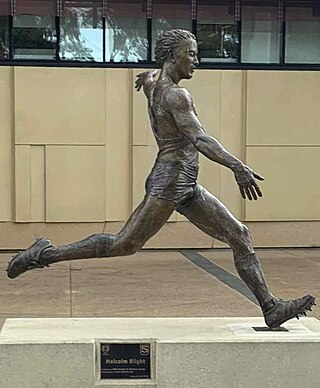
Malcolm Jack Blight AM is a former Australian rules footballer who played for and coached the North Melbourne Football Club in the Victorian Football League (VFL) and Woodville Football Club in the South Australian National Football League (SANFL). He also coached the Geelong Football Club, Adelaide Football Club and St Kilda Football Club.

Leigh Raymond Matthews is a former Australian rules footballer and coach. He played for Hawthorn in the Victorian Football League (VFL) and coached Collingwood and the Brisbane Lions in the VFL and renamed Australian Football League (AFL).
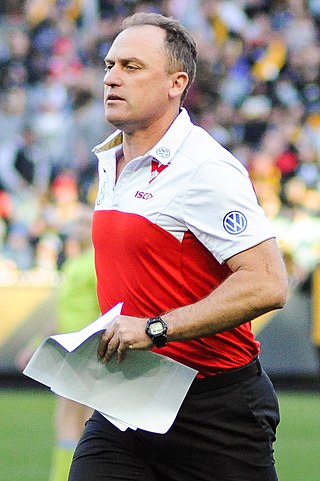
John Longmire is the current coach of the Sydney Swans in the Australian Football League (AFL) since 2010, and is the longest serving active AFL coach. As a player, he represented the North Melbourne Football Club in the Australian Football League (AFL) from 1988 to 1999.
Michael Tuck is a seven-time premiership-winning player, Australian rules footballer with the Hawthorn Football Club in the Victorian Football League (VFL) / Australian Football League (AFL).
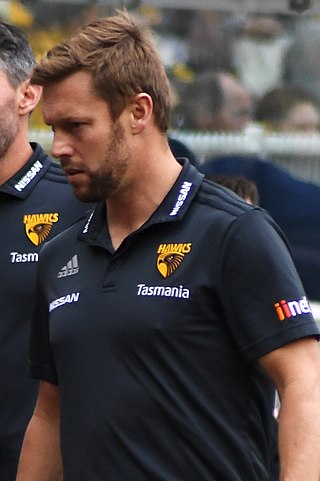
Samuel Mitchell is an Australian rules football coach and former player who is the current coach of the Hawthorn Football Club in the Australian Football League.

Alastair Thomas Clarkson is an Australian rules football coach and former player. He is currently the head coach of the North Melbourne Football Club in the Australian Football League (AFL) and was previously head coach of the Hawthorn Football Club from 2005 to 2021, where he won four premierships.
The 1960 VFL season was the 64th season of the Victorian Football League (VFL), the highest level senior Australian rules football competition in Victoria. The season featured twelve clubs, ran from 16 April until 24 September, and comprised an 18-game home-and-away season followed by a finals series featuring the top four clubs.
The 1965 VFL season was the 69th season of the Victorian Football League (VFL), the highest level senior Australian rules football competition in Victoria. The season featured twelve clubs, ran from 17 April until 25 September, and comprised an 18-game home-and-away season followed by a finals series featuring the top four clubs.
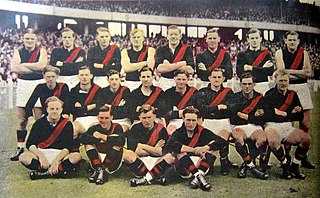
The 1949 VFL season was the 53rd season of the Victorian Football League (VFL), the highest level senior Australian rules football competition in Victoria. The season featured twelve clubs, ran from 16 April until 24 September, and comprised a 19-game home-and-away season followed by a finals series featuring the top four clubs.
The 1971 VFL season was the 75th season of the Victorian Football League (VFL), the highest level senior Australian rules football competition in Victoria. The season featured twelve clubs, ran from 3 April until 25 September, and comprised a 22-game home-and-away season followed by a finals series featuring the top four clubs.
The 1972 VFL season was the 76th season of the Victorian Football League (VFL), the highest level senior Australian rules football competition in Victoria. The season featured twelve clubs, ran from 1 April until 7 October, and comprised a 22-game home-and-away season followed by a finals series featuring the top five clubs – an increase from the four clubs which had contested the finals in previous years.
The 1973 VFL season was the 77th season of the Victorian Football League (VFL), the highest level senior Australian rules football competition in Victoria. The season featured twelve clubs, ran from 7 April until 29 September, and comprised a 22-game home-and-away season followed by a finals series featuring the top five clubs.
The 1977 VFL season was the 81st season of the Victorian Football League (VFL), the highest level senior Australian rules football competition in Victoria. The season featured twelve clubs, ran from 2 April until 1 October, and comprised a 22-game home-and-away season followed by a finals series featuring the top five clubs.

Luke Beveridge is an Australian rules football coach and former player who played for Melbourne, Footscray and St Kilda in the Australian Football League (AFL) during the 1990s. He is senior coach of the Western Bulldogs.

The Hawthorn Football Club, nicknamed the Hawks, is a professional Australian rules football club based in Mulgrave, Victoria, that competes in the Australian Football League (AFL). The club was founded in 1902 in the inner-east suburb of Hawthorn, making it the youngest Victorian-based team in the AFL.

Brendan Whitecross is a former Australian rules football player who played with the Hawthorn Football Club in the Australian Football League.
The 1978 VFL Grand Final was an Australian rules football game contested between the Hawthorn Football Club and North Melbourne Football Club at the Melbourne Cricket Ground on 30 September 1978. It was the 82nd annual Grand Final of the Victorian Football League, staged to determine the premiers for the 1978 VFL season. The match, attended by 101,704 spectators, was won by Hawthorn by a margin of 18 points, marking that club's fourth premiership victory.
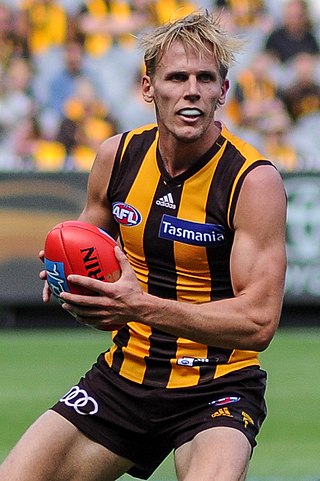
William Langford is a former Australian rules footballer who played for the Hawthorn Football Club in the Australian Football League (AFL).

David Mirra is a former professional Australian rules footballer who played for the Hawthorn Football Club in the Australian Football League (AFL). Following his AFL career, he joined Collegians Football Club in the VAFA competition.
References
- ↑ "Legend elevation: Knights". hawthornfc.com.au. 26 April 2017.
- ↑ Driscoll, Hannah (8 July 2016). "Hawthorn legend Peter Knights prepares for Vic Country final farewell". The Weekly Times.
- 1 2 "Peter Knights". Camberwell High School Ex-Students Society. Retrieved 3 February 2023.
- ↑ Colangelo, Anthony; Pierik, Jon (25 June 2020). "AFL legend John Kennedy snr dies aged 91". The Age .
- ↑ Browne, Ashley (7 October 2016). "Crimmo's Cup - The story behind the Hawks' 1976 triumph and the famous photo". hawthornfc.com.au.
- ↑ "Peter Knights" . Retrieved 14 April 2022.
- ↑ "Peter Knights" . Retrieved 14 April 2022.
- ↑ "PETER KNIGHTS" . Retrieved 14 April 2022.
- ↑ "Peter Knights" . Retrieved 14 April 2022.
- ↑ Allsop, Richard (22 June 2016). "Footy Flashbacks: Round 14". hawthornfc.com.au.
- ↑ "PETER KNIGHTS" . Retrieved 14 April 2022.
- ↑ "Peter Knights" . Retrieved 14 April 2022.
- ↑ "PETER KNIGHTS" . Retrieved 14 April 2022.
- ↑ "Peter Knights" . Retrieved 14 April 2022.
- ↑ "The best 250th in Hawthorn history?". hawthornfc.com.au. 30 May 2016.
- ↑ Smithers, Patrick (26 March 1985). "Knights waits on tests". The Age . p. 46.
- ↑ "PETER KNIGHTS" . Retrieved 14 April 2022.
- ↑ "Peter Knights" . Retrieved 14 April 2022.
- ↑ Pierik, Jon (6 May 2014). "Warwick Capper's life with bad-news Bears". The Age.
- ↑ Shock and tears at golden boy's demise
- ↑ "ENCYCLOPEDIA OF AUSTRALIAN FOOTBALL CLUBS" (PDF). Retrieved 16 March 2022.
- ↑ "PETER KNIGHTS" . Retrieved 14 April 2022.
- ↑ "Devonport Football Club Inc.- Where the Magpies Reign - Devonport Tasmania - Australia". Archived from the original on 31 July 2008. Retrieved 21 September 2009.
- ↑ "PETER KNIGHTS" . Retrieved 14 April 2022.
- ↑ "PETER KNIGHTS" . Retrieved 14 April 2022.
- ↑ "Peter Knights" . Retrieved 14 April 2022.
- ↑ Driscoll, Hannah (29 April 2016). "Hawthorn great Peter Knights to call it a day". The Weekly Times.
- ↑ "PETER KNIGHTS" . Retrieved 14 April 2022.
- ↑ "Peter Knights – Stats". AFL Tables. Retrieved 16 August 2014.
- 1 2 Panahi, Rita (5 February 2015). "Peter Knights wants to find cure for daughter Sarah's illness". Herald Sun.
- 1 2 Panahi, Rita (23 October 2015). "Sarah Knights takes first steps after being told she might never walk". Herald Sun.